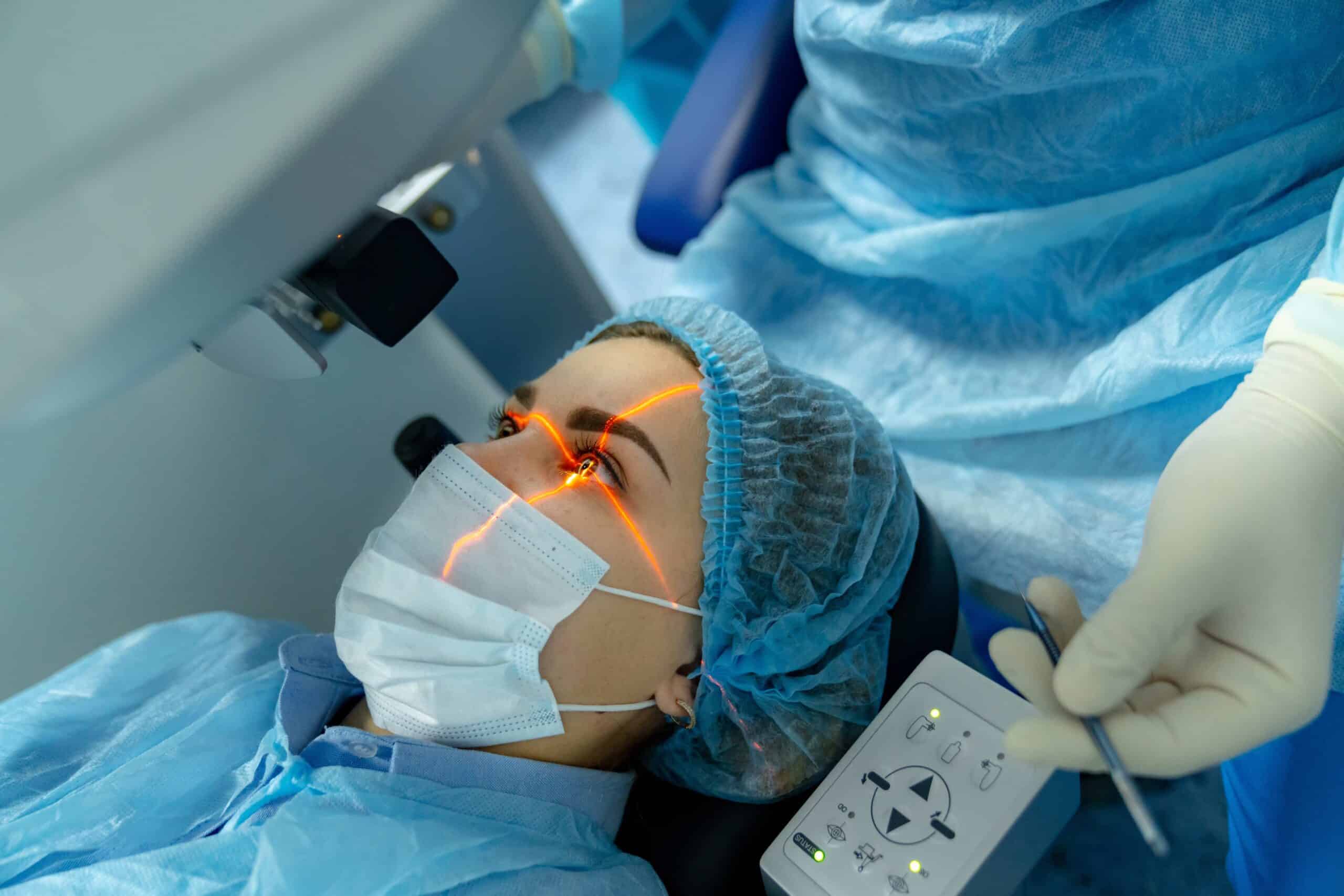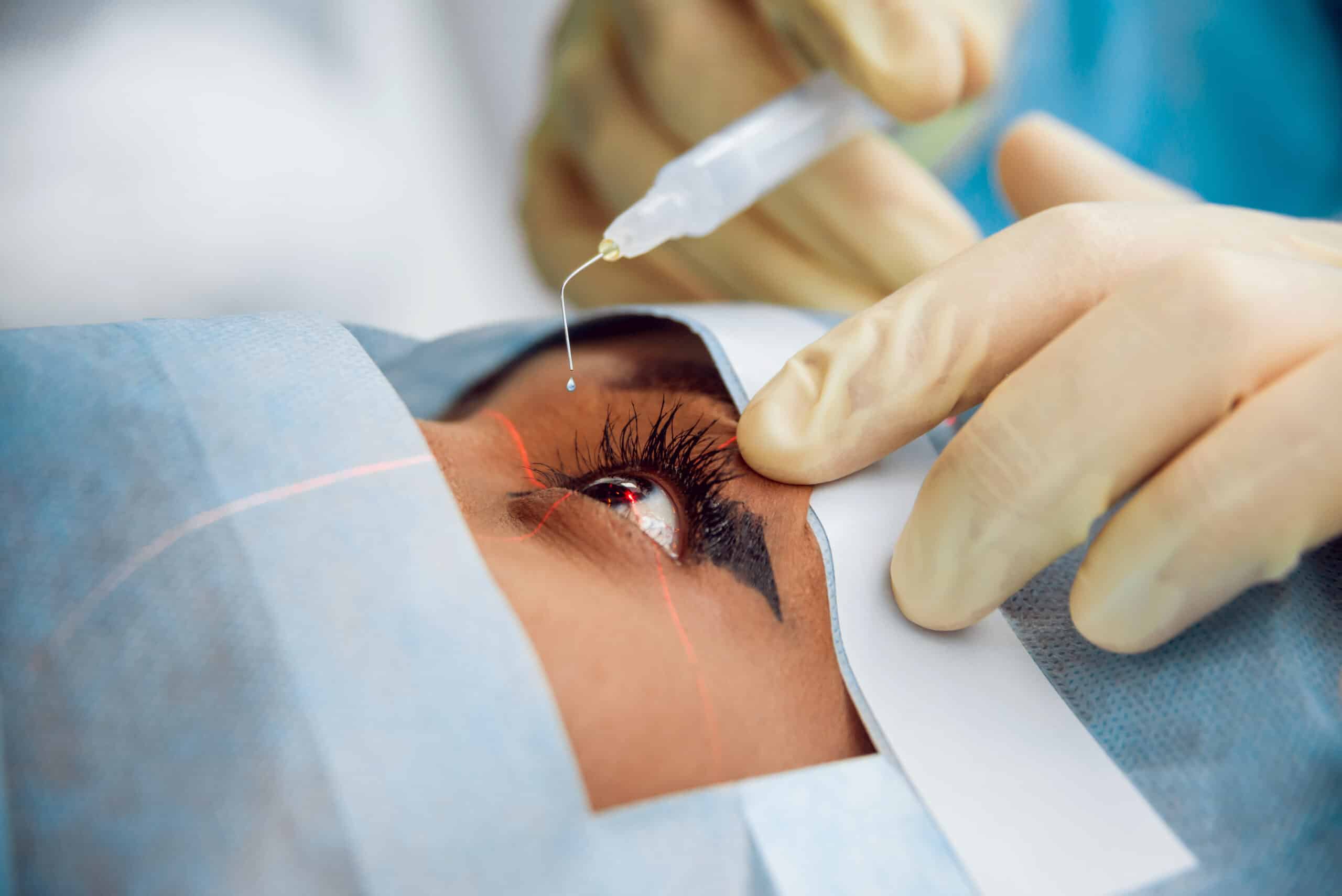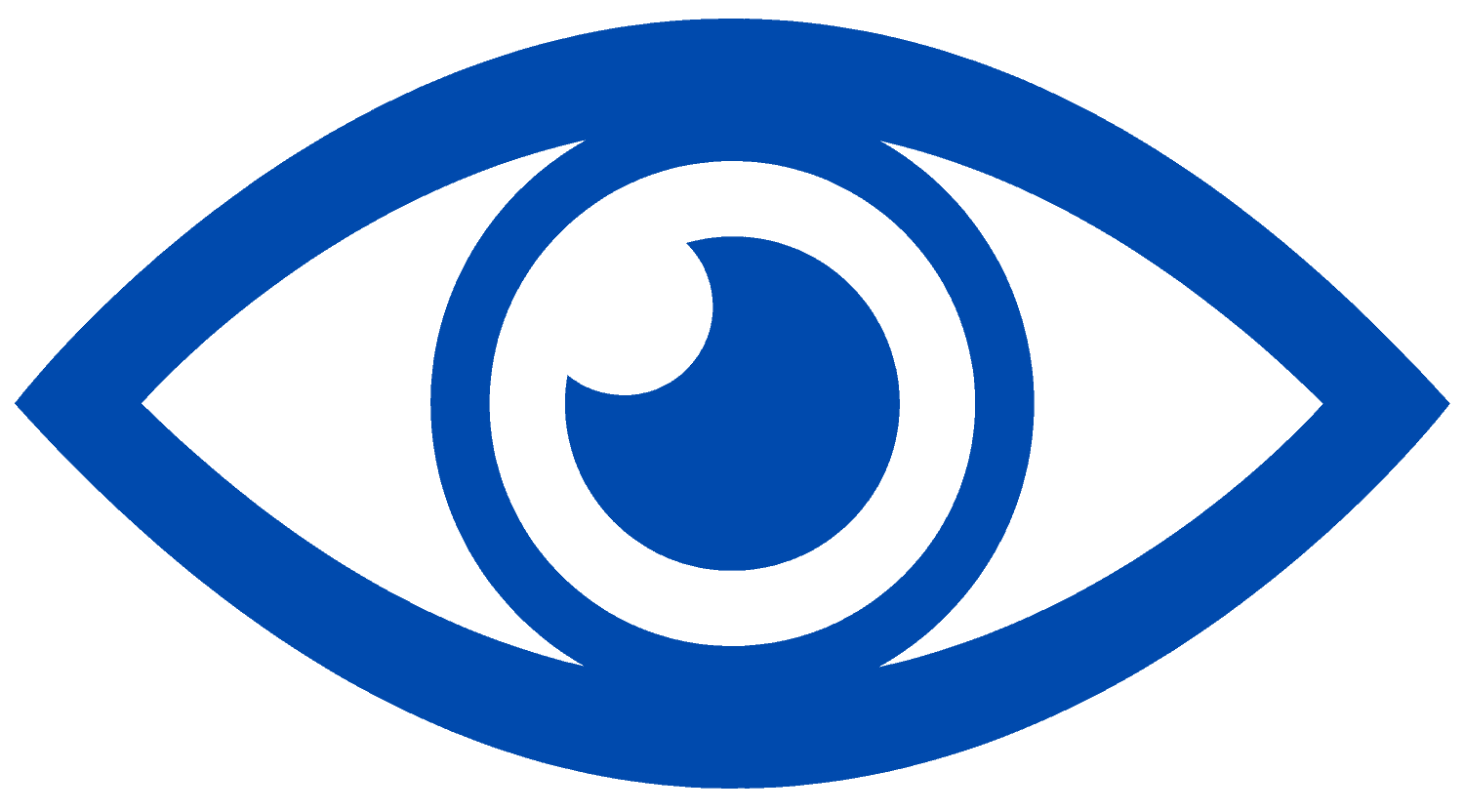Refractive Surgery
Correct and focus your vision with safe and effective refractive eye surgeries in Brisbane

Dr Geoffrey Ryan is a leading eye surgeon in Brisbane, with more than a decade of experience in patient-focused eye surgery.
Dr Geoffrey Ryan is a highly qualified and skilled eye surgeon who not only provides an exceptional level of care and expertise but also takes the time to ensure you are at ease and your questions are answered. We use world-leading equipment and up-to-date technology that has performed over 150 million lens calculations and counting. So you can rest assured that with Dr Ryan, your eyes and vision are in good hands.


Would you like to restore your vision with vision correction surgery?
Restore your vision and clarity while removing the need to wear glasses or contact lenses, with PRK surgery or Lasik surgery laser eye surgery, implantable contact lenses, or cataract surgery.
What is refractive surgery?
Any procedure which aims to reduce a person’s need for glasses or contact lenses can be considered a refractive procedure.
If you would like to look at refractive surgery options and find out whether you are a candidate for laser eye surgery or other vision correction options via refractive surgery, book an appointment today.
Dr Ryan will take the time to assess your suitability, understand your vision needs, and will recommend which option is best for you, while answering any questions you may have about refractive eye surgery.

Why have refractive surgery?
There are many benefits to refractive eye surgery, the biggest being the restoration of clarity and vision, which reduces the need to wear glasses or contact lenses.
- Vision correction surgeries that reduce refractive error
- Reduce the need for glasses or contact lenses
- Safe and effective treatment
- Quick recovery
Our refractive surgery services
Laser eye surgery
Laser vision correction (PRK/LASIK surgery)
Laser vision correction, otherwise known as laser eye surgery or refractive laser surgery, involves using a laser to adjust the front surface of the eye to help better focus your vision without glasses.
Lasik and PRK are the two most common types of refractive laser surgery or laser eye surgery, and are vision correction surgeries that treat nearsightedness, farsightedness, and astigmatism. Both PRK and Lasik laser eye surgery procedures use laser light to reshape the cornea to correct or improve vision.
Dr Ryan will assess your vision correction needs and eye health and determine whether you are a candidate for laser refractive surgery, whether you are suitable for PRK or Lasik surgery, and will recommend the best laser eye surgery option for you. Book an appointment to discuss your suitability for PRK or Lasik surgery, or other refractive surgery options today.


Implantable contact lenses
Implantable Collamer Lens (ICL)
An Implantable Collamer Lens (ICL), commonly referred to as an implantable contact lens, is a refractive lens implant that is placed in the eye, on top of the existing natural lens.
Implantable Collamer Lens eye surgery is an excellent option for anyone not suitable for laser surgery vision correction. It is also reversible by removing the lens.
Custom lense replacement
Refractive lens exchange
Custom lens replacement, otherwise known as refractive lens exchange, is a refractive surgery that replaces your natural eye’s lens with a custom artificial lens, correcting refractive errors in your natural lens.
During a refractive lens exchange surgical procedure, Dr Ryan will remove your natural lens in the eye and replace it with a custom artificial lens.
Custom lens replacement lenses correct:
- Myopia (shortsightedness)
- Hyperopia (farsightedness)
- Astigmatism (oval shape)
- Presbyopia (the need for reading glasses)
A multifocal artificial lens can give a range of vision from distance to near without glasses. This option involves removing the natural lens before any clouding (cataract formation). This refractive surgery is therefore considered elective and is not covered by Medicare or private health insurance.

Cataract surgery
Vision correction surgeries for cataracts
Many of our patients who have cataracts ask us, what is refractive cataract surgery, and what does it involve?
Refractive cataract surgery is a refractive surgery procedure that involves the removal of a cloudy lens and replacement with an artificial lens.
All of the glasses errors discussed can be corrected with this surgery, and multifocal lens technology can be used.
Medicare and private health insurance will help with the associated costs of cataract surgery.
What is the process for refractive eye surgery?
Dr Geoffrey Ryan’s process for refractive eye surgery, whether it is laser eye surgery, implantable collamer lens surgery, cataract surgery or custom lens replacement eye surgery, is as follows;
1. Assessment
The first step in the process of any of our refractive eye surgeries is to assess your vision, eye health and suitability. This involves performing a wide range of investigations in order to assess your suitability for laser eye surgery, contact lens implants, lens replacements, and any other refractive error correction options, and decide which procedure is best for you.
2. Meet Dr Ryan
The second step in the process is to meet with Dr Geoffrey Ryan. This gives Dr Ryan an opportunity to discuss with you your goals regarding your eye surgery and answer any questions you may have about the process or expected results.
3. Procedure
Your refractive surgical procedure or laser eye surgery will then take place. Dr Ryan is a leading Brisbane eye surgeon with over 10 years of experience, so you can rest assured that your eye surgeon is highly skilled and provides a high level of care.
4. Follow Up
Following your eye surgery procedure, we will follow up with you at set intervals and check your progress to ensure that you feel supported and at ease during the healing process and to check that everything is progressing well. We'll check in on how you're feeling, how your eyes are adjusting, and perform eye health checks at regular intervals until your eyes have fully adjusted and recovered from your laser eye surgery or other refractive surgery procedure. The period of recovery is quick, but we'll be with you every step of the way for your peace of mind.
Refractive surgery pricing
Wondering how much refractive eye surgery costs? Our pricing for each type of eye refractive surgery is as follows (please note these prices do not include anesthetist):
PRK (Laser eye surgery)
$3,000 per eye or $4,770 for both
LASIK (laser eye surgery)
$3,500 per eye or $6,550 for both
Implantable Collamer Lens (ICL)
$6,000 per eye
Custom lens replacement / Refractive lens exchange
$6,000 per eye
Cataract Surgery
Dr Ryan participates in the “Known Gap” scheme for insured cataract surgery Patients without insurance will get a no-obligation quote prior to booking surgery for their cataract refractive surgery cost.
Book Refractive Assessment
Book your assessment with a specialised optometrist to find out if you are suitable for refractive surgery.

Refractive Surgery Questionnaire
Do you have an upcoming appointment for Refractive Surgery?
For our patients with an upcoming appointment for Refractive surgery we would like to ask them to fill in this form prior to their consultation.
Our Refractive Surgery FAQs
In general, a suitable candidate will:
- Be at least 18 years old and have a stable glasses prescription over the last 24 months.
- Have a healthy cornea (front window of the eye) and no active eye disease.
- Refractive surgery should be avoided during pregnancy and in anyone suffering from certain autoimmune conditions.
The best age for LASIK (laser-assisted in situ keratomileusis) is typically between 20 and 40 years old. At this age, the eyes have usually stopped developing and have a stable prescription, which is necessary for the surgery to be effective. Beyond this age we start to consider lens based refractive procedures.
LASIK (laser-assisted in situ keratomileusis) and PRK (photorefractive keratectomy) are both types of laser eye surgery used to correct refractive errors like nearsightedness, farsightedness, and astigmatism. However, there are some differences between the two procedures:
- Flap creation: In LASIK, a thin flap is created on the surface of the cornea and lifted to access the underlying tissue. In PRK, the thin outer layer of the cornea is removed entirely, which means there is no flap created.
- Recovery time: LASIK generally has a faster recovery time than PRK. Because PRK involves removing the outer layer of the cornea, it takes longer for the surface to heal completely, and vision may be blurry for a few days to a week after the procedure. In contrast, most people who have LASIK can return to work or normal activities within a day or two.
- Corneal thickness: Because LASIK involves creating a corneal flap, it requires a certain amount of corneal thickness. PRK, on the other hand, can be a better option for people with thinner corneas.
- Pain and discomfort: PRK can be more uncomfortable immediately after the procedure than LASIK, as the surface of the cornea is healing. Patients may experience burning or stinging sensations, and they will need to use topical pain medication.
In general, both LASIK and PRK are safe and effective procedures, and the choice between the two will depend on the individual’s specific needs and circumstances.
The procedure itself is completely pain free. After PRK surgery, it is normal to experience some level of pain or discomfort, particularly in the first few days following the procedure. Eyedrops and oral medication is provided to reduce this discomfort.
The recovery process after laser eye surgery, such as LASIK or PRK, can vary depending on the individual and the type of procedure performed. However, there are some general guidelines that can help you understand what to expect:
- LASIK has a quicker recovery than PRK.
- Immediately after surgery: You may experience some mild discomfort, burning, or itchiness in your eyes. Your vision may be blurry or hazy, and you may feel a little disoriented.
- For LASIK, many people will notice an improvement in their vision within the first day or two after the procedure, with significant improvements over the course of the first week. Some people may even be able to return to work or normal activities within a day or two.
- For PRK, it can take a bit longer for the vision to improve, and it may take several weeks for your vision to stabilize. During this time, your vision may fluctuate or be hazy, but this is normal as your eyes are healing.
While laser eye surgery, such as LASIK or PRK, can be highly effective for many people, it may not be suitable for everyone. The success of the surgery depends on several factors, including the type and severity of the refractive error, the thickness and shape of the cornea, and other individual factors.
In general, laser eye surgery is most effective for people with mild to moderate myopia (nearsightedness), hyperopia (farsightedness), and astigmatism. People with more severe refractive errors or certain underlying eye conditions may not be good candidates for the surgery.
It is also important to note that laser eye surgery is not a guaranteed solution for vision problems, and there is no guarantee that the surgery will fully correct your vision. Some people may still require glasses or contact lenses after the surgery, and some may experience temporary or permanent side effects such as dry eyes, halos, or glare.
Before undergoing laser eye surgery, Dr Ryan will decide if you are a good candidate. He does not take unnecessary risk and will inform you if you are not suitable for this procedure.
On average, the actual laser part of the procedure typically only takes a few minutes per eye. However, the entire process, including preparation, anesthesia, and post-operative care, can take a few hours.
Laser eye surgery, like any medical procedure, carries some risks. It’s important to be aware of these risks before deciding to undergo the procedure. However, it’s also important to remember that serious complications are rare, and most people who undergo laser eye surgery are satisfied with the results.
Some of the risks associated with laser eye surgery include:
- Dry eyes: After the surgery, some people may experience dry eyes, which can cause discomfort and blurry vision. This is usually temporary and can be managed with eye drops.
- Infection: There is a small risk of infection after laser eye surgery. This can usually be prevented with antibiotic eye drops and careful post-operative care.
- Overcorrection or undercorrection: In some cases, the surgery may not correct the vision as intended, resulting in overcorrection or undercorrection. This can usually be corrected with additional surgery or glasses/contact lenses.
- Halos or glare: Some people may experience halos, glare, or other visual disturbances after the surgery. This is usually temporary, but in rare cases, it can be permanent.
- Corneal flap complications (for LASIK): LASIK surgery involves creating a corneal flap, which can occasionally result in complications such as flap dislocation, wrinkling, or infection.
Your surgeon will discuss the risks and benefits of the procedure with you and help you determine if laser eye surgery is the best option for your individual needs. With proper pre-operative evaluation, surgical technique, and post-operative care, the vast majority of people who undergo laser eye surgery experience improved vision without complications.

